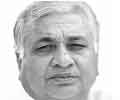
The following testimony by Caliph Umar may sound shocking to the
champions of Islamic law today, but it shows how strongly women asserted their
rights. He says, “Once I shouted at my wife and to my horror she paid me back in
the same coin. Further she said: why are you so upset, the wives of the Prophet
reply back to him and some of them do not speak to him whole day long. What she
said appalled me... Then I dressed up and went to Hafsa (Prophet’s wife) and
asked her: Does any of you keep Allah’s Apostle angry all the day and she
replied in the affirmative” (Bukhari 3.648).
Islam had not only imparted a sense of equality and dignity to women
but had vehemently denounced female infanticide saying, “When the female, buried
alive, is questioned, for what crime was she killed?” (81.8-9). Fatwa makers may
also be questioned for what crime they wish to confine women within the four
walls of their homes. -- ARIF M. KHAN
By ARIF M. KHAN
Islam had not only imparted a sense of equality and dignity to women
but had vehemently denounces female infanticide saying, “When the female, buried
alive, is questioned, for what crime was she killed?” (81.8-9). Fatwa makers may
also be questioned for what crime they wish to confine women within the four
walls of their homes.
The recent Deoband fatwas on working women provoked a healthy debate,
in which comments made by which comments made by young Muslim men and women were
particularly enlightening. Since these fatwas are mostly based on juristic
principles years after the death of the Prophet, it is important to take a look
at some cases reported in early Muslim society to ascertain how women fared
during the Prophet’s time.
A prophetic narration reported by Imam Malik and Muslim says, “Fatima
bint Qais, an emigrant woman in Medina received three marriage Proposals after
she became a widow. Since one proposal was from Usma bin Zayd, a freed slave of
the Prophet, she decided to entrust her affair to the Prophet and asked him to
make a choice on her behalf. Moreover she had left the house of her deceased
husband so they discussed the question where she should spend her waiting period
(Iddat). The Prophet first advised her to move to the house of Umm Sharik, a
rich lady of Medina known for her generosity and hospitality. On second thought,
he told her, ‘Don’t do that because Umm Sharik is frequently visited by people
and I do not want you to come before the strangers with your head uncovered.’”
The other version says, “This is a woman whom many of my companions visit”
(Muwatta 29.67 and Muslim 1373). So the Hadith books tell us that Medina had
women who received and entertained visitors not related to them and that these
women were held in high social esteem.
Another interesting anecdote shows how fiercely women guarded their
independence and free-thinking. A slave woman called Barira negotiated her
freedom and the money was paid by a wife of her Prophet. After her freedom,
Barira exercised her legal right to annul her Marriage with Mughith, the man she
had married when she was slave. Mughith was deeply in love with Barira and could
not bear to be separated from her. He would cry inconsolably and roam the
streets of Medina chanting her name. The Prophet saw him one day and moved by
his condition asked Barira, “Why don’t you return to him?” Barira asked, “Do you
order me to do so?” The Prophet replied, “No. I only intercede for him.” Barira
turned down the advice by saying, “I am not in need of him” (Bukhari 7.206).
The assertion of freedom of choice on the part of women is powerfully
portrayed in another episode involving the wife of Tahibit bin Qais, a companion
of the Prophet. The lady was unhappy with her marriage and approached the
Prophet seeking legal separation from her husband. On being asked she admitted
that Tahbit was a man of good character and fulfilled all his duties as a
husband. “But physically he is very unattractive and I feel revulsion when he
comes near me. I fear that it may lead to some transgression on my part,” she
said. The Prophet asked her, “Will you return the garden that he has given you
as dower?” She replied in the affirmative.
The Prophet summoned her husband and ordered him to take back his garden
and divorce her.
The following testimony by Caliph Umar may sound shocking to the
champions of Islamic law today, but it shows how strongly women asserted their
rights. He says, “Once I shouted at my wife and to my horror she paid me back in
the same coin. Further she said: why are you so upset, the wives of the Prophet
reply back to him and some of them do not speak to him whole day long. What she
said appalled me... Then I dressed up and went to Hafsa (Prophet’s wife) and
asked her: Does any of you keep Allah’s Apostle angry all the day and she
replied in the affirmative” (Bukhari 3.648).
Islam had not only imparted a sense of equality and dignity to women
but had vehemently denounced female infanticide saying, “When the female, buried
alive, is questioned, for what crime was she killed?” (81.8-9). Fatwa makers may
also be questioned for what crime they wish to confine women within the four
walls of their homes.
Source: The Sunday Guardian




 Sultan Shahin
Sultan Shahin


0 comments:
Post a Comment